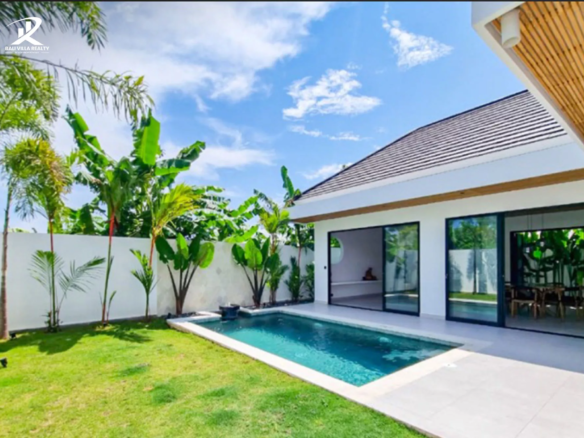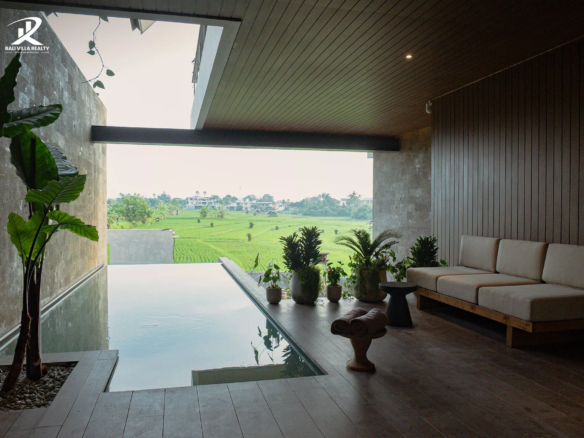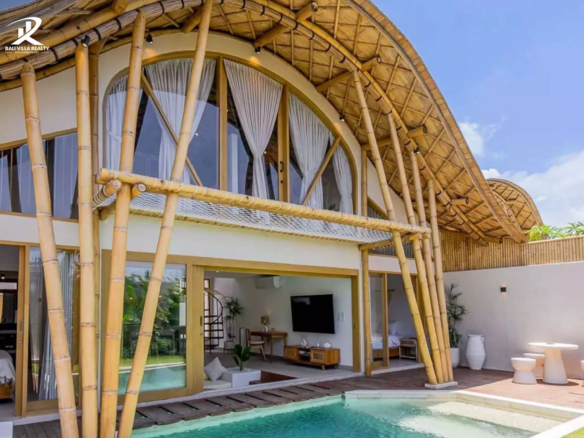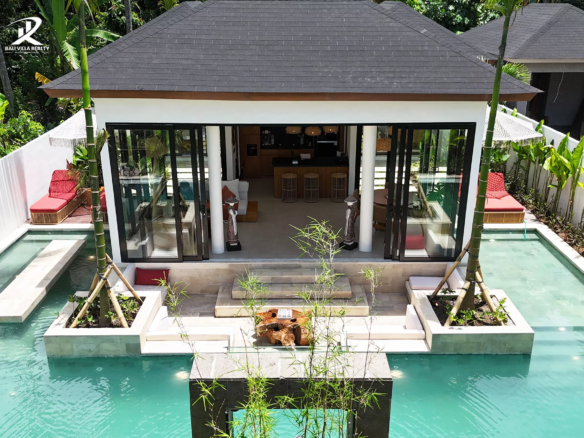Buying property in Bali sounds like a dream come true, right? But many foreign investors share one big fear: What if the property doesn’t make any money?
It’s a valid concern. Nobody wants to invest their hard-earned money into a property that fails to deliver returns, whether through rentals or future resale value.
Don’t worry—this guide will show you how to avoid bad property investments in Bali. We’ll also explore the main reasons why some villas don’t make a profit. Keep reading.
Contents
Key Takeaways
- Wrong choices kill profits. Poor location, unclear goals, or chasing trends often lead to low returns.
- Location is the biggest success factor. Choosing the right area (prime or emerging) directly impacts rental demand and long-term value.
- The right setup brings steady income. Prime or emerging areas, long lease or freehold, and move-in-ready villas perform best.
Why Your Property in Bali Doesn’t Make Money?

1. Location Doesn’t Match the Concept
You can have a beautiful villa, but if it’s in the wrong spot, guests won’t book.
For example, if you build a yoga-style retreat in noisy Seminyak, guests will complain about traffic and nightclubs.
A villa in the quiet Seseh area is also not ideal if your renters want Bali nightlife and parties. It’s far from hotspots like bars and beach clubs, so guests may feel bored.
2. Buying Without Clear Goals
Many buyers skip the first step: deciding what they really want. Will it be:
- Income, lifestyle, or resale?
- Families, digital nomads, or wellness travelers?
- Self-use or rental only?
Each answer points to a different location. For example:
- Canggu: digital nomads, high rental turnover
- Ubud: wellness and longer stays
- Jimbaran: families and calm living
- Bingin: surfers and sunset seekers
3. Ignoring Infrastructure
Two villas may look alike, but reviews and ROI depend on basic factors like:
- Paved roads
- Strong internet
- Reliable water and electricity
- Walkable cafés and shops
A great villa in a weak location won’t perform without proper infrastructure.
4. Chasing Trends Without Research
Social media hype can be risky. Some “hidden gems” actually lack zoning, access roads, or utilities.
One real example we’ve seen: a foreign buyer purchased land in North Bali after seeing a viral video. He thought it was a great investment.
But he failed to check the infrastructure. Some areas in North Bali still don’t have proper roads, consistent power, or steady rental demand.
In the end, his property became more of a burden than an asset.
Read More: The Hidden Dangers of Investing Alone in Bali
How to Ensure Your Property Brings in Rental Income
One of the biggest fears for foreign investors is buying a property that doesn’t generate rental income.
So, if you want to avoid losing money when buying villa in Bali, just simply follow these tips:
1. Location Is Everything
Source: Bali Villa Realty - Beautiful 5-Bedroom Villa for Sale in Ubud
One of the biggest factors that determine rental success is location. Where your property is located will largely dictate its appeal to tourists and expats looking for long-term rentals.
| Category | Example Areas | Why It Matters | Investment Potential |
|---|---|---|---|
| Prime Rental Locations | Seminyak, Canggu, Ubud | These areas already have high tourist demand, meaning villas are more likely to stay booked year-round. | Safer bets for steady rental income with lower risk. |
| Emerging Areas with Growth Potential | Kedungu, Uluwatu | These regions are becoming more popular as new cafés, resorts, and attractions develop. | Potential for long-term value growth and strong future rental demand. |
Choosing the right location means you’re already halfway to ensuring your property generates steady rental income.
2. Leasehold vs. Freehold—Which Yields Better Returns?
Yes, your choice between leasehold and freehold matters. Many foreign investors opt for leasehold properties because they’re more affordable upfront.
However, the remaining time on the lease plays a huge role in determining rental potential.
If a property only has a few years left on the lease, it’s less attractive to renters or future buyers. For example, properties with 20 years or more left on the lease are much better for long-term rental potential and future returns.
Suppose you’re eligible to own a freehold property (such as by forming a PT PMA). In that case, you’ll have full ownership and flexibility, often making it easier to sell or rent without restrictions.
A longer lease or freehold status means more time and flexibility to generate income and hold onto the property as a valuable asset.

Get a Customized Investment Plan in Bali
With over 15+ years in the market, here’s what we can do for you:
- Find the best location to invest in Bali.
- Reliable guidance on Bali’s property market and laws.
- Personalized strategy to maximize returns and meet your financial goals.
3. Be Careful with Renovation Costs
Before buying, assess whether the property needs major renovations. Properties requiring extensive repairs or updates can quickly drain your finances, cutting your potential profits.
If the property is already in good shape, you can start renting it out immediately without spending extra on renovations, saving you time and money.
Tips: Aim for move-in-ready properties or those that require minimal work so you can start generating rental income as soon as possible.
Read More: Cost of Property in Bali: What You Need to Know (2025)
4. Have a Solid Exit Strategy

You may want to sell the property at some point, and having a well-thought-out exit strategy is crucial. This ensures that you can sell for a profit when the time is right.
But when is the right time to sell? Honestly, there’s no one-size-fits-all answer. The best time to sell is whenever you feel ready.
Of course, market conditions can play a role, but the decision shouldn’t be entirely based on something out of your control.
If your circumstances have changed or you feel you’ve achieved what you wanted from your investment, it’s time to sell.
It’s not just about what the market is doing; it’s about your needs and goals.
Bali’s property market tends to appreciate over time, so you’ll likely see a positive return whether you sell now or later.
Tips: To ensure a smooth and safe selling process, follow the proper legal process and work with trusted professionals.
5. Understand the Local Market
Failing to understand the Bali property market is a common pitfall for new investors. Understanding what types of properties are in demand and who your potential renters are is key.
Who’s your ideal renter? Families, vacationers, and digital nomads each have different needs.
Know your target audience so you can select the right property.
For example, vacationers may want a beachfront villa, while digital nomads prefer a peaceful retreat with fast internet.
Knowing your audience lets you choose a property that aligns with rental demand, keeping it occupied more consistently.
6. Stay Competitive
Bali has many villas available for rent, and knowing what’s out there helps you stay competitive.
Look at similar properties in the area to see how much they charge and how often they’re rented.
It’s tempting to charge high rent, but if your price is too high compared to others, your property could stay empty. Keep your rates competitive to attract renters.
Don't forget to seek for unique features that can make your property stands out, like great view, modern amenities, or a private pool. These features will make your property more desirable, increasing your chances of higher occupancy rates.
Read More: How an Agent Can Help You Market Your Property
7. Property Management
Source: TJM Bali - Villa Management
You might be thinking, How do I handle everything if I don’t live in Bali full-time? The good news is that you don’t have to manage the property yourself.
A good property management service can ensure your property stays rented and maintained.
Yes, property management comes with a fee, but it’s worth it if it helps keep your property occupied and maintained.
In the long run, it can increase your rental income by keeping your property in top shape.
8. Market Your Property to Attract Renters
Even the best property can sit empty if nobody knows about it. Effective marketing is key to attracting renters.
You can list your property on popular booking sites like Airbnb or work with a property manager who handles marketing for you.
It’s all about visibility—making sure potential renters see your property.
Early bird discounts or seasonal promotions can help fill your calendar, especially during slow seasons.
Read More: Ultimate Guide: How to Start an Airbnb Business in Bali
Conclusion
Investing in Bali property can be highly rewarding, but only if you avoid common mistakes that stop your villa from making money.
The keys are simple: choose the right location, understand the market, secure a solid lease or ownership structure, and manage the property well. Do this, and you’re already on track to a profitable investment.
Remember that real estate is a long game. With patience, planning, and the right guidance, you can achieve the returns you’re aiming for.
Have questions? Our team is here to guide you every step of the way. Book your free, private consultation today—no strings attached.
Want to start investing in Bali property?
Have a quick chat with our real estate experts for personalized advice on your Bali investments. No commitment required.
FAQ
Single-family homes are generally considered safer because their purchase price is more affordable compared to multifamily or commercial properties. This option suits investors who want to build a balanced portfolio with lower risk.
With tourism continuing to grow and increasing demand for luxury accommodations, villas in Bali have strong potential to generate high rental income.
The majority of apartments for sale in Bali are offered on a leasehold basis, as this makes it easier for foreigners to purchase them.
1-bedroom villa: 12.28%–17.95% ROI
2-bedroom villa: 12.73%–18.49% ROI
3-bedroom villa: 12.73%–15.95% ROI
4-bedroom villa: 13.20%–16.40% ROI











